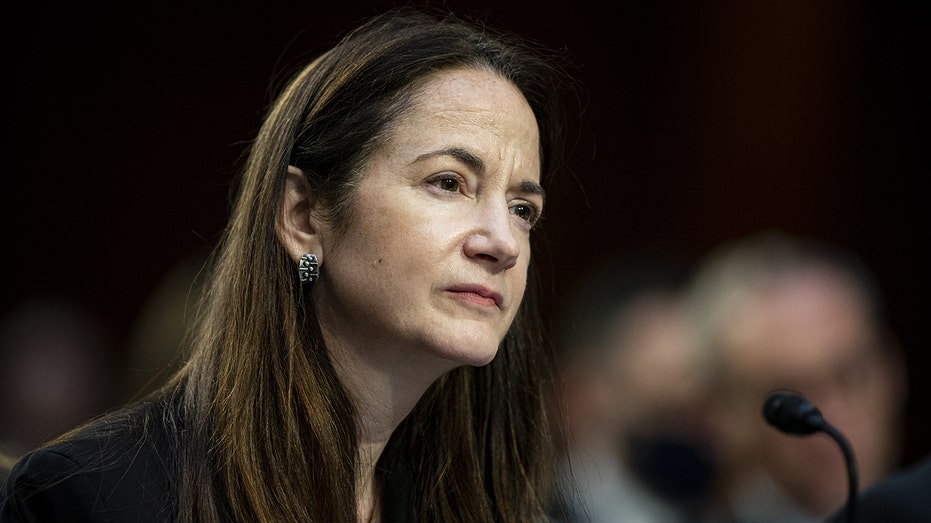Director of National Intelligence (DNI) Avril Haines deemed the Chinese Communist Party the “most consequential threat to U.S. national security” during her opening statement before the Senate Intelligence Committee Wednesday in unveiling the intelligence community’s annual assessment.
“In brief, the CCP represents both the leading and most consequential threat to U.S. national security and leadership globally,” Haines said Tuesday. “Its intelligence, specific ambitions and capabilities make it for us our most serious and consequential intelligence rival.”
Chinese President Xi Jinping, recently elected to a third, five-year term, gave a speech this week which Haines categorized as “the most public and direct criticism that we’ve seen from him to date, and probably reflects growing pessimism in Beijing about China’s relationship with the United States, as well as Xi’s growing worries about the trajectory of China’s domestic economic development and indigenous technology innovation challenges that he now blames on the United States.”
Haines told Congress despite “more public and directly critical rhetoric,” the U.S. intelligence community assesses Beijing “still believes it benefits most by preventing a spiraling of tensions and by preserving stability in its relationship with the United States.”
US INTEL COMMUNITY WARNS OF ‘COMPLEX’ THREATS FROM CHINA, RUSSIA, NORTH KOREA
“The next few years are critical as strategic competition with China and Russia intensifies, in particular of how the world will evolve and whether the rise of authoritarianism can be checked and reversed,” Haines said. “The People’s Republic of China, which is increasingly challenging the United States economically, technologically, politically and militarily around the world, remains our unparalleled priority. Chinese Communist Party, or CCP under President Xi Jinping, will continue efforts to achieve Xi’s vision of making China the preeminent power in East Asia and a major power on the world stage.”
“To fulfill Xi’s vision, however, the CCP is increasingly convinced that it can only do so at the expense of U.S. power and influence,” she said. “And by using coordinated whole of government tools to demonstrate strength and compel neighbors to acquiesce to its preferences, including its land, sea and air claims in the region and its assertions of sovereignty over Taiwan.”
In his opening remarks, Committee Chairman Sen. Mark Warner, D-Va., admitted that while America was focused for two decades on counterterrorism, China “was racing to overtake the United States in a range of emerging and foundational technologies such as advanced wireless communications, semiconductors, quantum synthetic biology, and next-generation energy, as well as taking not only the extraction but the processing of rare earth minerals that are so critical in so many of those technologies.”
HOUSE COMMITTEE SAYS FAUCI ‘PROMPTED’ DRAFTING OF MEDICAL PAPER TO ‘DISPROVE’ COVID LAB LEAK THEORY
He also pointed to interest in what the IC assessment says on the origins of COVID-19.
“Despite China’s denials, it is entirely fair for us to ask whether the virus that has killed at least 6.8 million people so far might have been accidentally released from a lab in Wuhan,” Warner said. “The lack of transparency in China’s authoritarian systems may mean that we will never be absolutely certain or COVID-19 or, God forbid, the next pandemic could have or will next originate.”
The committee’s lead Republican, Sen. Marco Rubio, of Florida, in turn spoke of how even members of Congress came of age in a “post-Cold War fantasy,” distracted as multinational corporations have consolidated important industries are deeply invested in foreign supply chains.
“And public discomfort, frankly, because we become a society addicted to cheap products from China and viral videos on Tik Tok,” Rubio said.
“China. Russia. Iran. North Korea. Global terrorism. Narco terrorists operating just right off and across our border and even in the homeland. All these are very serious threats,” he said. “But it is my view that the greatest threat facing America is not another country. It is whether or not we have the ability and the willingness to accurately assess and appropriately adapt our foreign and domestic policies in this time of historic, revolutionary and disruptive technological, social, economic and geopolitical changes.”
























